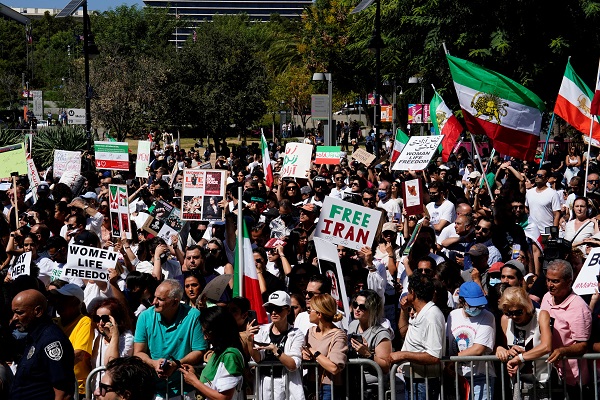 Demonstrators at a Freedom Rally for Iran, protesting in support of Iranian women and against the death of Mahsa (Zhina) Amini, outside City Hall in Los Angeles, California, US, 1 October 2022;
Credit: Reuters/Bing Guan/File photo
Demonstrators at a Freedom Rally for Iran, protesting in support of Iranian women and against the death of Mahsa (Zhina) Amini, outside City Hall in Los Angeles, California, US, 1 October 2022;
Credit: Reuters/Bing Guan/File photo
WASHINGTON (Reuters) -The United States, the United Kingdom and Canada on Friday 15 September 2023, imposed more sanctions on Iran ahead of the one-year anniversary of the death of Kurdish Iranian woman Mahsa Amini whilst in Iran's morality police custody, which sparked months of anti-government protests that faced an often violent crackdown.
Amini, 22, died on 16 September 2022 after being arrested for allegedly flouting the Islamic Republic's mandatory dress code. Her death sparked months of anti-government protests that marked the biggest show of opposition to Iranian authorities in years. Iranian security forces have been deployed in her hometown in anticipation of unrest this weekend.
The US, UK, and Canada, along with the European Union, have announced multiple rounds of sanctions against Iran, citing the widespread and often violent crackdown on protests after the death of Amini.
"Mahsa’s tragic and senseless death in the custody of Iran’s so-called 'Morality Police' sparked demonstrations across Iran that were met with unspeakable violence, mass arrests, systemic internet disruptions and censorship by the Iranian regime," US Secretary of State Antony Blinken said in a statement.
"We will continue to take appropriate action, alongside our international partners, to hold accountable those who suppress Iranians’ exercise of human rights," he said, adding that Canada, Australia, and other partners were also imposing sanctions this week.
The US Treasury Department in a separate statement said it imposed sanctions on more than two dozen people and entities it said were connected to Iran's "violent suppression" of protests in the wake of Amini's death its crack down on dissenting voices and restrictions to internet.
The action targets 29 people and groups, including eighteen key members of the Islamic Revolutionary Guard Corps (IRGC) and Iran's Law Enforcement Forces (LEF), as well as the head of Iran's Prisons Organizations, the department said. They also target officials linked to Iran's internet blockade and several media outlets.
The sanctions target LEF spokesperson Saeed Montazerolmehdi, multiple LEF and IRGC commanders, and Iran’s Prisons Organization chief Gholamali Mohammadi.
Douran Software Technologies CEO Alireza Abedinejad as well as state-controlled media organizations Press TV, Tasnim News Agency and Fars News were also among those sanctioned.
"The United States [...] will continue to take collective action against those who suppress Iranians’ exercise of their human rights," the Treasury's Under Secretary for Terrorism and Financial Intelligence, Brian Nelson, said in the statement.
White House national security adviser Jake Sullivan said that Washington would have more sanctions in coming days.
"We'll continue to sanction Iranian behavior, whether it is flouting basic norms of human rights contained in the Universal Declaration or it's relative to the work that Iran is doing to provide weapons to Russia to kill Ukrainian civilians, and we'll have more designations on that in the coming days," Sullivan told reporters.
The US has taken several actions targeting the supply of Iranian drones to Russia, reflecting its concerns about Iranian-Russian military cooperation and Russia’s use of Iranian drones in its conflict with Ukraine.
The UK separately announced its sanctions targeting senior Iranian decision makers enforcing Tehran's mandatory hijab law, including Iran's minister for culture and Islamic guidance, his deputy, the mayor of Tehran and an Iranian police spokesman.
Canada's sanctions package announced on Friday, which was its fourteenth since October last year against Iran, listed restrictions against six individuals. They included members of the IRGC and the "Supreme Council for Cultural Revolution," the Canadian government said.








